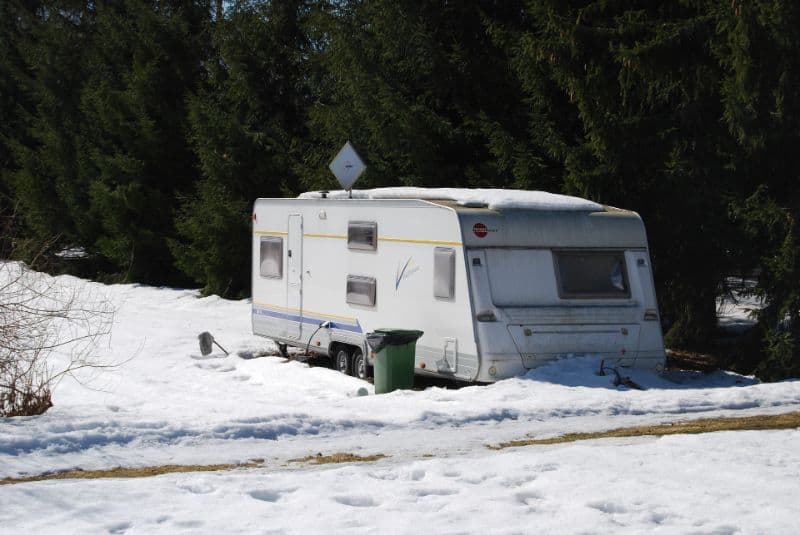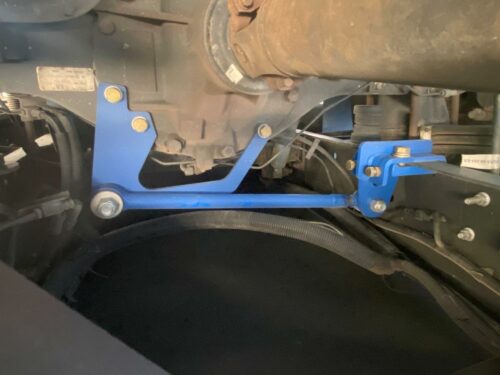Should you cancel your RV insurance during the off-season while the RV is in storage? Couldn’t this save you big money on premiums?
Good thinking! – but there’s a better way. Let’s talk about seasonal RV insurance, also known as storage-only RV coverage. Essentially, you can choose to drop full coverage (usually collision, maybe comprehensive) on your RV while is not being used. It’s a popular strategy to save you money on your policy premiums.
But what does this coverage actually entail? And what happens if something happens to your RV while it’s in storage?

Who Is Eligible for Seasonal/Storage RV Insurance?
Do you only use your motorhome or camper for part of the year and then store it for the rest?
- Do you park or store your RV during the winter off-season?
- Does your RV remain stationary while you’re snowbirding in Arizona, Texas, or Florida?
- Do you place your RV on a rented seasonal lot for part of the year?
If you keep your RV off the road for more than 30 consecutive days (aka one month) of the year, you should consider seasonal or storage RV insurance.
How Does Seasonal/Storage RV Insurance Work?
With seasonal or storage RV insurance, you will be able to suspend some or all of your insurance coverage during the months that you’re not using your RV. This can be a great way to save money on your premiums (easily $400+) if you are a part-time RVer.
- Seasonal RV insurance is tailored towards RV owners with RVs on campground lots, usually rented for a season.
- Storage RV insurance is tailored towards RV owners who will be putting their RVs into storage (at home or in a facility) during the off-season.
Some agencies don’t distinguish between the two.
Generally, seasonal/storage RV insurance suspends liability, or collision, or both. Most RV owners choose to keep comprehensive coverage.
You can suspend parts of your RV insurance for 1-11 months out of the year, depending on your policy.
However, it’s important to note that you should not suspend your comprehensive protection when you purchase seasonal RV coverage. There is always a chance that your RV could be vandalized, stolen or damaged even while in storage, so it’s best to have some coverage year-round. We’ll talk more about the risk vs. rewards later.
Not all insurance carriers offer seasonal RV insurance. Those that do either include it as optional add-on coverage in your policy, or else they allow you to manually roll back coverage as requested.
Don't Cancel Your RV Insurance!
It’s important to note there’s a big difference between cancelling (i.e. terminating your policy) and suspending coverage. Many RV insurance carriers will give you the option to suspend coverage for a season, but they won’t be happy if you cancel it. Remember, maintaining continuous coverage makes you eligible for discounts.
Don’t just cancel your insurance policy. You might be assigned a “high-risk” reputation. You’ll have to enroll again next season, which can increase your premiums, even for the same deductibles. And carriers can choose not to work with you if you have previously cancelled similar policies. At the very least, your premiums will increase. Don’t game the system!
What Coverage Can I Decline During the Off-Season?
Ultimately, you will need to speak with your insurance agency to review the details of your policy. However, here are some common coverages you can suspend while not driving your RV.
- Collision. Your RV will not be covered for damages caused by a collision with another RV, vehicle, boat, etc.
- Comprehensive. Your RV will not be covered for theft, vandalism, Acts of Nature, etc. Be very careful removing this coverage! Hail storms and falling trees can wreak havoc on units stored outside.
Many RV owners choose to only suspend liability and a few add-ons, such as pet insurance, windshield replacement, or roadside assistance.
Please note that some states require year-round coverage if your RV is registered.
Insurance Carriers That Offer Seasonal/Storage RV Coverage
National General
National General offers a Storage Option which allows you to suspend some coverage for the months you’re not using your RV, while still carrying enough insurance to cover fires, storms, wind and theft.
Safeco
Safeco takes a little different tack. Their Generous Usage Season assumes you’ll be active in your RV for up to 150 days a year. The discount for a 7-month offseason is already built into the policy.
Farmers
Farmers offers storage-only RV insurance for the off season. It covers your rig for theft, vandalism, fire, hail, etc. However, it does not cover damage caused by a collision, whether with another RV, vehicle, boat, etc.
Amica
Amica allows RV owners to suspend liability coverage when the RV is in storage, keeping comprehensive.
Good Sam
Good Sam offers an RV Storage Option to save on premiums by suspending coverage when your RV is not in use.
Progressive
Available from September 1st through December 31st, Progressive allows motorhome and camper owners to reduce their off-season premiums by temporarily reducing certain coverages, such as Collision and Medical Payments.
What Are the Risks of Cancelling Your RV Insurance During the Off-Season?
While it is certainly possible to save money on your RV insurance premiums by dropping collision and comprehensive coverage during the off-season, it’s important to weigh the risks involved.
- Theft from a storage lot or backyard is rare, but it can happen, so it’s important to have some level of protection in case your RV is targeted.
- Fires and acts of nature (trees failing, hail, windstorms, etc.) are also potential risks.
- if your RV is parked next to another unit, there’s always the possibility of accidental damage. These bumps would be classified as “collisions” and would not be covered if your dropped coverage. You’ll have to pay out of pocket for any repairs!
Ultimately, it’s up to you to decide whether the peace of mind that comes with storage RV coverage is worth the cost. But whatever you decide, be sure to review your policy carefully so that you understand exactly what is and is not covered.
Remember, there’s a big difference between terminating your policy versus suspending coverage with the approval of your agency!
Other Seasonal/Storage RV Insurance FAQs
Does It Make a Difference Where I Store My RV?
Yes, it absolutely can!
If you store your RV on your home property, then theft or other damages to the RV may be covered under your homeowner’s insurance policy. Be very careful with this assumption, however! Most homeowner’s policies are nowhere near as comprehensive as an RV insurance policy, even if the RV is “covered.”
However, if you store your RV at a storage facility, you will need to A) purchase a separate storage insurance policy to protect your investment or B) include protection in your standard RV insurance policy. Remember that many storage facilities require proof of insurance!
Some insurers, like Progressive, do not offer a storage option in the southern states. Conversely, many policies for RVs in the northern states are automatically pro-rated based on the shorter usage season.
What If I Own an Expensive RV?
As a rule, the more expensive the RV, the more valuable RV insurance is. Saving a few hundred dollars a year isn’t worth the risk of an $8,000 repair bill! If you drive a large, well-maintained RV, such as a Class A diesel pusher or luxury 5th wheel, you should lean towards maintaining full comprehensive and collision coverage for the full year.
What If My RV Isn’t Fully Paid Off?
Many RV financing contracts don’t give you the option to reduce coverage on your RV until it’s fully paid off. This protects their investment. Or they may allow you to remove liability or collision coverage while the RV is parked in storage, but not comprehensive (thefts, Acts of God, etc.)
How to Go About Suspending Your RV Insurance For Storage
In most cases, suspending RV insurance during the winter is as simple as picking up the phone and speaking with your insurance agent.
Andy Herrick is a blogging nerd, #8 Enneagram, wannabe bread baker, INTJ, RV industry professional, and small business entrepreneur. He can be found hanging out with his lovely wife and family, skiing, cycling, climbing, hiking, and convincing anyone who will listen why dogs aren’t really that great of pets. Also, he runs this website.
-
Andyhttps://changingears.com/author/andrew-herrick/
-
Andyhttps://changingears.com/author/andrew-herrick/
-
Andyhttps://changingears.com/author/andrew-herrick/
-
Andyhttps://changingears.com/author/andrew-herrick/








